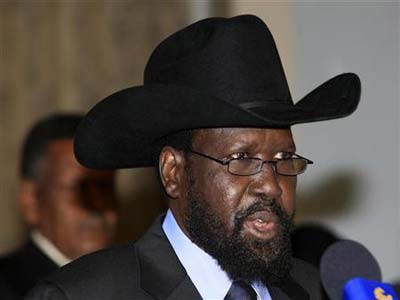 South Sudan’s warring rivals were locked in peace talks Monday in a bid to broker a deal to end 20 months of civil war, just hours ahead of deadline to avoid possible sanctions.
South Sudan’s warring rivals were locked in peace talks Monday in a bid to broker a deal to end 20 months of civil war, just hours ahead of deadline to avoid possible sanctions.
President Salva Kiir and rebel chief Riek Machar met alongside regional presidents in Ethiopia, under intense diplomatic pressure to sign a deal by a Monday deadline, Kenyan President Uhuru Kenyatta said.
But Kiir, who arrived in Ethiopia late Sunday, said he had been “compelled” to join the talks, and warned it would not be possible to sign a lasting or full peace deal until all opposition factions could join the agreement.
“A peace that cannot be sustained cannot be signed,” Kiir said Sunday. “You should sign something that you will enjoy. If it is signed today and then tomorrow we go back to war, then what have we achieved?”
Kenyatta however was more optimistic, saying late Sunday that the talks were “on course to strike a deal”.
The rivals met Sunday with talks lasting late into the night, before negotiations resumed on Monday morning, diplomats said.
Key issues of disagreement include a power-sharing proposal between the government and rebels, which could see Machar return as vice-president.
– ‘Enough is enough’ –
Tens of thousands of people have been killed in the civil war, and South Sudanese civil society groups on Monday pleaded for a “stoppage of bloodshed” and a deal to be struck.
“Enough is enough,” a dozen groups said in a joint statement. “The people of South Sudan cannot raise another generation of South Sudanese children in civil war.”
Kiir initially said he would not attend talks, complaining it was not possible to strike an effective deal because rebel forces have split.
Powerful rebel general Peter Gadet and other key commanders last week accused Machar of seeking power for himself, and said they would not recognise any deal agreed.
South Sudan’s civil war erupted in December 2013 when Kiir accused his former deputy Machar of planning a coup, setting off a cycle of retaliatory killings that has split the poverty-stricken, landlocked country along ethnic lines.
The latest round of talks opened on August 6, mediated by the regional eight-nation bloc IGAD, the Intergovernmental Authority on Development, as well as the United Nations, African Union, China and the “troika” of Britain, Norway and the United States.
As well as Kenyatta, regional leaders at the talks include host Ethiopian Prime Minister Hailemariam Desalegn, as well as Ugandan President Yoweri Museveni — who has sent troops into South Sudan to back Kiir — and Sudanese President Omar al-Bashir.
– Ethnic massacres –
At least seven ceasefires have already been agreed and then broken within days, if not hours in Africa’s newest country, which broke away from Sudan in 2011.
Diplomats have warned any failure to sign a peace deal could trigger “serious consequences” for the rival leaders, including possible targeted sanctions and an arms embargo.
Marked by widespread atrocities on both sides, the war has been characterised by ethnic massacres and rape. Recent attacks have included castration, burning people alive and tying children together before slitting their throats.
More than 70 percent of the country’s 12 million people need aid, while 2.2 million people have fled their homes, the UN says, with areas on the brink of famine.



